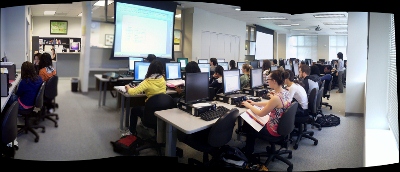Archive
Arachne, online database for archaeology
“ARACHNE is the free [account creation required] object database of DAI and the Institut of Classical Archaeology in Cologne. It provides more than 1 Million images of finds, architecture and excavations with meta information as well as digitised historical literature” (http://www.ariadne-infrastructure.eu/Services/Online-Services: Find more information and help on this page). Example of Advanced Search start choice page: 
Continue with Einzelmotive (singular motifs) (gets you back into an English interface also – the field-specific explanation on the right certainly helps): 
There is auto-search completion/suggestion, however, it seems to work only for German, and very eclectic: 

Beats having to plaster your surroundings with photos for making your own panoramas. ![]()
File renaming utilities
When working with foreign language (learning) digital media files electronic repositories, typical problems include having to:
- adding metadata information to the filename
- handling of foreign language characters in filenames across operating and file systems, including code pages
A good file renaming utility can work wonders in such situations.
I have been using the excellent BRU (Bulk rename utility) for a while, and always liked its flexibility – which is apparent from in its (initially somewhat intimidating) UI:
Now I found to my surprise, and confirmed with the help of the support forum, that the foreign language character support is lacking from BRU’s Regular Expression implementation.
Enter Renamer, another file renaming utility, which features a stable and beta version, pdf documentation and a wiki.
As you can see in the following screenshot, Renamer makes it possible, using Unicode character codes in Regular Expressions, to replace e.g. all Mandarin characters in a filename.
Renamer also has in-built support for common tasks like cleaning up filenames by stripping common tags, transliterating foreign alphabets or adding file numbering (serializing).
Both utilities are free and highly recommended, but also see TBA:part II for limitations.
UPDATE:
The Films on Demand subscription of Atkins library
- Benefits:
- provides access to over ten thousand streaming videos.

- including world languages:

- Remaining Problems:
- 741 titles for World languages is not a lot (additional materials may be applicable to language learning, but I do not see the most commonly requested foreign language films used in the department which we are currently trying to rescue across the demise of VHS). Any particular silo of information is not comprehensive (given the power of the network effect, YouTube wins hands-down most if the times),
- any content is difficult to integrate into a language skill curriculum,
- any added interface restrictions may make it more difficult, not more stable,
- not unlike YouTube, files you may have used, even linked, can get removed.
- the website seems to be available only on campus – even if you are logged into your campus account (university VPN will likely help, and not, given that it has video throughput issues).
How to use Bulk Rename’s RegEx matching capability
Much desired, but took me a while to figure that one out:
By default, any filename with a matched substrings will be replaced by nothing;
What you want to remain, you have to refer to in the replacement with backticks:





![image_thumb[2] image_thumb[2]](https://plagwitz.files.wordpress.com/2011/06/image_thumb21.png?w=210&h=244)

